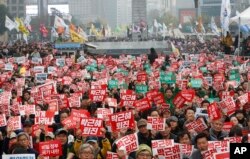Tens of thousands of South Koreans protested in the streets of their capital Saturday, demanding President Park Geun-hye's resignation over a scandal involving her longtime confidante and former advisers.
South Korean reporters said the mass demonstration in Seoul was the largest display of anti-government sentiment in years. They quoted police estimates of the number of protesters ranging up to 50,000 people, although organizers claimed the crowd was several times larger than that.
A mass of demonstrators holding banners and signs accusing the president of treason gathered in a central square, Gwangwhamun, for the rally, which lasted for hours but began to disperse before midnight. Nearly 20,000 police were on hand, ready to prevent any move by the protesters toward the presidential office and residence, the Blue House, less than two kilometers away.
Candlelight vigils and other anti-Park rallies took place in other cities and in the province considered to be her stronghold.
Park friendship
The protests centered on Park's friendship with Choi Soon-sil, 60, the daughter of a late cult leader, and two former presidential aides. They are accused of pressuring South Korean businesses into giving $70 million to foundations that Choi controlled. Beyond that, demonstrators said they thought Choi had manipulated government policy and actions and had exerted undue influence over the president — even editing advance texts of Park's speeches.
Choi was arrested several days ago, and Park's former advisers have been detained.
On Sunday, the Seoul Central District Court granted a warrant to prosecutors to arrest the two former aides, Reuters reported. An Chong-bum, a former senior advisor for Park, faces charges of abuse of power and attempted extortion. The second aide is Jeong Ho-seong.
In what was seen as an apology to the nation, Park discussed the corruption allegations late Friday and promised that she would allow an investigation of her conduct in office. She did not, however, mention the charge that she had allowed Choi to meddle in important government decisions on policy and personnel.
In the streets Saturday, protesters repudiated Park's statement and said they would not be satisfied until she stepped down or was removed from office. At a minimum, they said, the president must abstain from any role in domestic affairs, and turn over her duties to a prime minister chosen by parliament.
A national poll released Friday said Park's approval rating had dropped to just 5 percent — the lowest for any president in South Korea since the country shook off decades of military dictatorship in the 1980s and began a period of free elections and democratic rule.
A university student demonstrating Saturday in Seoul said she fully supported Park's removal from office, even though an abrupt change could create a power vacuum in the country. "However, that is no worse than giving all of the power given by the people to some stranger [Choi Soon-sil]," Choi Eun-hye told the semiofficial Yonhap news agency.
'Power of citizens'
Another demonstrator, Han Jin-wook, told a reporter, "I wanted to show my children the power of citizens. ... Some media reported the rally would be violent, but I feel totally safe."
As Saturday night's protests subsided, demonstration leaders said they expected to hold an even bigger gathering next week.
Park has 15 months left in her term. If she resigns early, the country is required to hold an election to choose her replacement within 60 days.
Park, 64, became South Korea's first female president in 2013. She is the daughter of former President Park Chung-hee, who ruled South Korea as a military strongman from 1961 to 1979, when he was assassinated.






